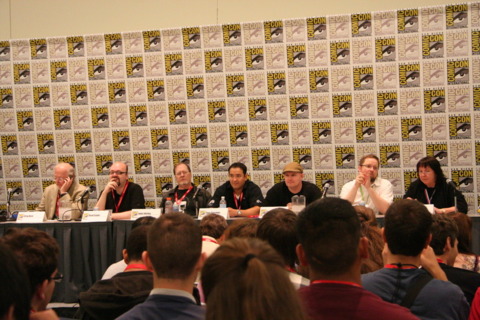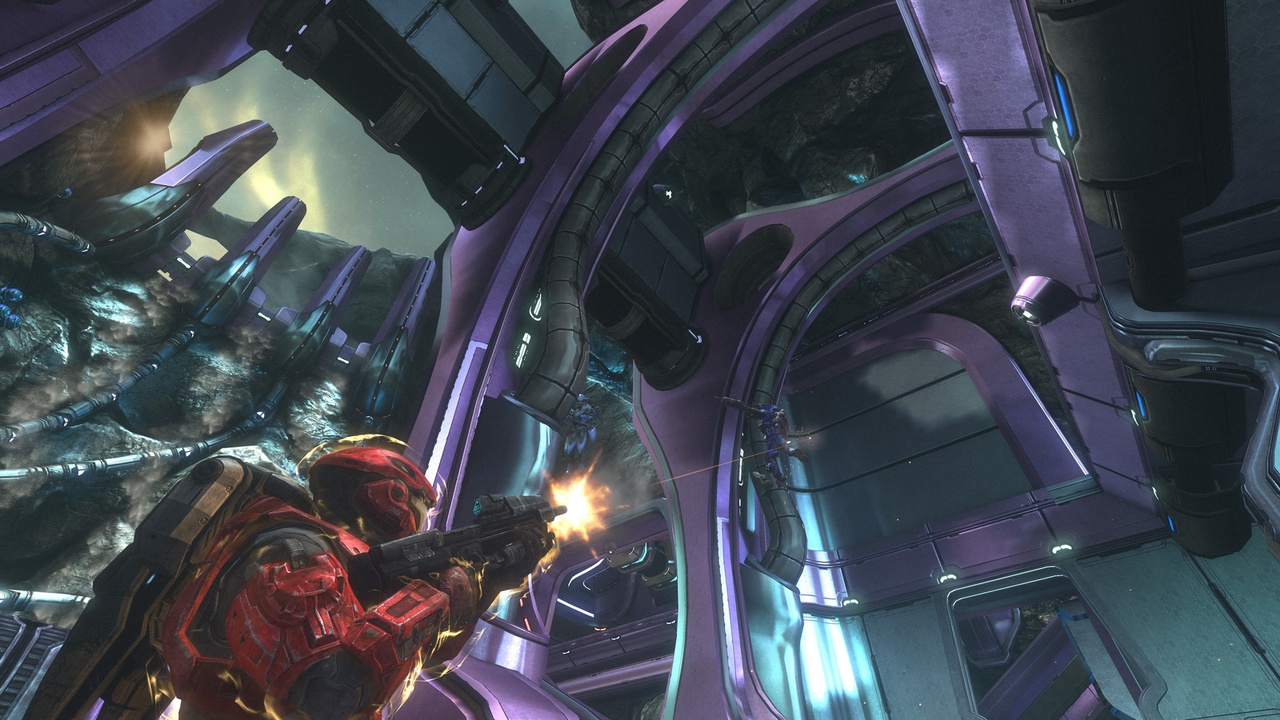From Halo to hardback
Comic-Con 2011: Authors from Gears of War, BioShock, and other popular franchises gather to share their experience when it comes to working for an interactive medium.
Who was there: Greg Bear (Halo), Karen Traviss (Gears of War), David Gaider (Dragon Age), John Shirley (BioShock: Rapture), Tony Gonzalez (Eve Online), Frank O'Connor (creative director of 343 Industries), and Kevin Grace (managing editor of 343, Halo: Evolution).

What they talked about: There's no doubt that storytelling has evolved quite a bit in video games over the years, but the interactive medium can still prove to be a challenge when there are technological restraints. The panel consisted of authors who are established science fiction writers, some with television backgrounds and some who continue the franchise storyline outside of games.
BioWare's Gaider has found that writing novels gives him a chance to branch out stories that he never got to follow in the game. He also noted that the experience is vastly different when he's writing on his own instead of working with an entire team of writers and developers.
For John Shirley, who has experience writing for television and movies, he recognizes that video games are an evolving art form and feels that stories in early games seemed like they just grabbed "someone's nephew" to do it. Eventually, Shirley started to see the difficulty of writing for games and said that there was a lot of collaboration needed between himself and BioShock game designer Ken Levine. He acknowledged that at times it would be frustrating and that they would have their disagreements, but in the end it all worked out for the best. He also added that the hard part was getting into the mind of the original designer and his universe.
Gears of War series writer Traviss stressed that a writer needs to respect the customers and that when you're writing for comics, novels, and games, each medium must be treated very differently. She talked about technical constraints, acknowledging that sometimes "you have to say yes" when asked to make adjustments to the story. Traviss pointed out that franchise work should still be considered original, because an author brings a lot of his or her ideas into the universe. She also commented on the fact that receiving royalties when working on a franchise is not a bad deal either from a business perspective.
Halo scribe O'Connor chimed in to point out that when dealing with his franchise, authors are carefully chosen and encouraged to bring original thought to the series; they're not looking for someone who can just talk about Halo. Direction may be given in terms of where the team wants the story to go, but it's up to the author and their skill set to expand on it.
Writing for a massively multiplayer online game has its challenges for any writer. They may have been steeper for Gonzalez, considering he wasn't actually an author when he got involved with Eve Online. He was initially a programmer and a fan of the game, but things snowballed from there. As he continued working on the project, he was asked to write press releases and some in-game content. That eventually led him to write a novella that was successful within the community, and he was then brought on board to write a book.
"It's a perpetual work in progress," said Gonzalez about Eve Online. "It's a post-humanistic dystopian world where ordinary people can be extraordinary, which at the core is the heart of storytelling from my perspective."
Traviss then went on to talk about how important it was that a writer likes and respects the people that he or she has to collaborate with. She said that an author doesn't necessarily have to be a fan of the IP, and in her case, she may even avoid it. Learning about the franchise is an exploratory process for her--coming up with psychological profiles of all the characters, for example--but it's the people she has to work with that are a major deciding factor. Another factor is that the franchise has to fit her niche to help build her own brand and help sell her other books because it's a competitive space.
Shirley described some writers as being natural television writers who rely on other people to spark ideas and work extremely well in a group situation. For himself, he didn't work as well under these conditions and had to adapt. He likened it to "chewing gum and dancing the ballet at the same time" because it's elaborate, and there are several things to do at once. Shirley said that he eventually developed the skills to collaborate but not until discovering more about his personal psychology and letting his ego take a backseat.
Before the panel ended, another topic that the writers touched upon was whether they listened to fan feedback and the pressures coming from the community. For Bear, Halo is about working with their players and fans to get ideas and input because at the end of the day, those are the people who pay the bills.
O'Connor addressed an audience question about where interactive media was heading and how it would affect print. He brought up the fact that there will always be a place for storytelling and the written word, whether it's in print or on a Kindle.
"I think people will always want to take a book to a quiet place and sit down. The best graphics and the best sound and the best immersion come from your mind," O'Connor said. "The book does it in a way that other forms of transmedia can't achieve."
Quote: "Plus we have to point out that the Sistine Ceiling was work hired upon a previous franchise."--Greg Bear, commenting on the question about whether the writers work toward legitimizing video games as art.
Takeaway: Collaboration is key when writing for video games, and writers should keep their egos in check.
Got a news tip or want to contact us directly? Email news@gamespot.com

Join the conversation